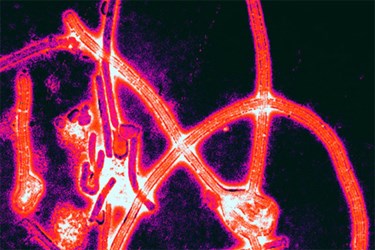Hemispherx Biopharma, USAMRIID Team Up To Evaluate Potential Ebola Drugs
By C. Rajan, contributing writer

Hemispherx Biopharma announced on Monday that it is collaborating with the United States Army Medical Research Institute of Infectious Diseases (USAMRIID) to test the company's drug Alferon, a commercially available natural alpha interferon (IFN) and Ampligen, an experimental drug, against the deadly Ebola virus. The studies will be conducted at the USAMRIID laboratories.
The Ebola virus prevents the body's natural immune response by blocking the cellular production of Type I IFN. According to Hemispherx, Ampligen was designed as an IFN inducer and has demonstrated antiviral activity in a wide variety of DNA and RNA viruses in pre-clinical testing. The company's strategy in using these two drugs against the Ebola virus disease is that Alferon will replenish an Ebola patient's natural interferon while Ampligen will restore the patient's innate immune response by overcoming the Ebola blocking mechanisms.
Alferon is a commercially-available multi-species alpha interferon which has been approved for the treatment of refractory or recurring external genital warts in the U.S. Ampligen is an experimental RNA-based therapeutic being developed for the treatment of diseases with immunologic defects and/or viral causation.
Hemispherx joins the dozens of other biopharmaceutical companies rushing to test their available drugs against the Ebola virus. U.S. government agencies such as the NIAID are supporting the drug developments efforts considerably, and some recent promising vaccines and therapeutic candidates developed to date with support from U.S. agencies are rushing toward development. Some of these candidates include:
- A monoclonal antibody “cocktail” MB-2003 and optimized anti-Ebola monoclonal antibody, zMapp, developed by Mapp Biopharmaceutical. Zmapp recently received a US federal contract to speed up its development.
- An investigational Ebola vaccine candidate developed by Okairos/GSK, in collaboration with the Vaccine Research Center (VRC). This vaccine has recently shown promise in a primate model and will be entering into a Phase 1 clinical trial in the next few weeks, pending approval by the FDA.
- BCX4430, a novel nucleoside with broad spectrum antiviral activity, which is developed by BioCryst Pharmaceuticals and funded by NIAID. A Phase I trial is expected to begin in late 2014 or early 2015.
- A multivalent Ebola/Marburg vaccine developed by Crucell biopharmaceutical company, which is expected to enter Phase I clinical trial in late 2015 or early 2016.
There are also several companies, including NewLink Genetics, Profectus Biosciences, Bavarian Nordic, and Chimerix, along with several research teams from universities such as UCLA and Thomas Jefferson University, which all have vaccines and drugs at different stages of development that are showing promise against the Ebola virus.
